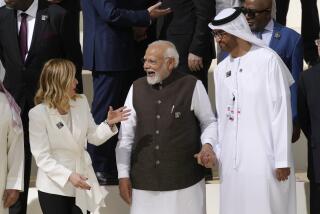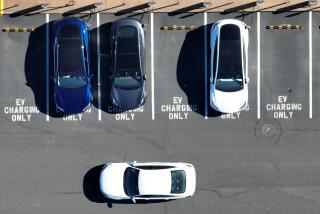India, China invited to U.S. climate forum
- Share via
WASHINGTON — A White House summit on climate change next month began to take shape Friday, with the announcement that invitations had been extended to such key developing countries as India and China as well as industrialized countries.
Conceived as a forum to discuss ways to halt the rise in global temperatures and show President Bush’s relatively recent embrace of the issue, the summit next month apparently will not signal any change in the administration’s policies. Bush opposes mandatory curbs on greenhouse gas emissions and emphasizes the development of clean technology over energy conservation.
“We expect to place special emphasis on how major economies can
At a G-8 conference in June, Bush announced that he would host the climate change conference as a way to bring developing nations, particularly the huge and growing economies of China and India, into negotiations over limiting pollution that is eroding the atmosphere.
In addition to India and China, invitees include G-8 nations, Brazil, South Korea, Mexico, Indonesia and South Africa, as well as European Union president Portugal and the United Nations.
Bush said he intended to address the Sept. 27-28 conference, which would be hosted by Secretary of State Condoleezza Rice.
The U.S., which is believed to emit the most greenhouse gases of any country, is the only G-8 nation not to sign the Kyoto Protocol, which requires countries to begin cutting emissions in 2008. Countries that did sign the treaty are scheduled to meet in Bali in December to draw up plans to make further cuts in emissions starting in 2012. Developing nations that did not sign the original treaty are expected to join those negotiations.
Environmentalists say they expect the White House conference to accomplish little if Bush is unwilling to consider making pollution cuts mandatory or establishing a carbon market in which cleaner companies could sell their “credits” to bigger polluters -- a system known as “cap and trade.”
“Everything they are talking about is voluntary, and when you talk voluntary, you get very minimal proposals. You get countries coming forward and offering to do what they were going to do anyway,” said David Doniger, policy director of the Natural Resources Defense Council’s Climate Center.
White House spokesman Scott Stanzel said the conference was not intended to undercut the need for mandatory standards, as some have suggested.
“This is an effort to help supplement the ongoing efforts in other places around the world,” Stanzel said in the daily White House briefing for reporters.
Bush’s position on global warming has shifted over the years. In his first term, he expressed doubts that the science was conclusive or that human action could affect global temperatures. More recently, he has expressed concern but has argued that the best way to counteract warming is by developing new, cleaner technologies.
More to Read
Get the L.A. Times Politics newsletter
Deeply reported insights into legislation, politics and policy from Sacramento, Washington and beyond. In your inbox twice per week.
You may occasionally receive promotional content from the Los Angeles Times.










